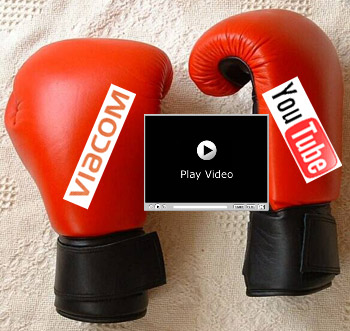by: Jason Mick

"The more you tighten your grip, ...the more star systems will slip through your fingers": Viacom is gaining a reputation as an internet bully -- deserved or undeserved
As a media company, there's always a fine line to tread concerning copyright protection. On the one hand you can't let your represented works be blatantly stolen, or you'll risk losing your source of income. However, if you are too zealous in targeting users in mass who might be guilty of posting a stray video online, you risk alienating your audience. Legally, you are entirely within your rights in doing so, but as a business that has to sell products or services, you risk losing the very business you try to protect.
Viacom recently won what many analysts say is a pyrrhic victory over Google that exemplifies this struggle. Viacom, MTV, and Paramount Pictures' parent company, have been at war with Google for over a year now over Google property YouTube and its users' actions. It slapped Google with a $1B USD copyright lawsuit, saying the company wasn't doing enough to prevent Viacom property, including South Park and the The Daily Show, from appearing on YouTube.
In a major legal victory last week, Viacom obtained a judge's order that Google must turn over all YouTube usernames, Internet Protocol addresses and the viewing histories of YouTube's users. However, the legal victory turned into a PR disaster for Viacom, which is being blasted across the web for alleged censorship and privacy violation. Viacom claims it never asked for and personal user information and its intentions are just. However, its response has done little to quell the fury.
The battle yet again illustrated the dichotomy between the perception of online rights of the average populous and the perception of rights by copyright holders. In reality, America has become a nation of infringers, according to many legal analysts. Eighty percent of Americans regularly use the internet and a large percentage of these file share or watch movies online, violating copyright laws with each click.
Even those innocent of overtly viewing infringed music or video likely have read articles, books, or papers that were improperly obtained or cited. The fact of the matter is simply that the majority of internet users -- and the population -- infringe on a regular basis in their actions, speech, and interactions. And they feel it's their right. Studies have shown that most internet users believe they should be able to access whatever content they want online, for free.
Google built a reputation partly as a champion of this spirit. It took on book publishers, newspapers, and Hollywood studios and won. Today, many books are posted on Google which strict copyright interpretation would disallow, and many technically infringed materials are searchable through or hosted on Google and its properties.
Louis Solomon, an attorney representing Viacom and various other copyright holders fighting Youtube/Google said Google is savvy in its approach. "I think there is little doubt that Google has been trying to be effective in its use of the press,” said Mr. Solomon. “How else do you explain why they have been collecting and using IP addresses to monetize their site (for a while now), yet only now, with great self righteousness, claim to be concerned about producing IP addresses?"
Ricardo Reyes, a Google spokesman however argued that the Mr. Solomon's logic is flawed and stated, "The law is on our side."
Mr. Reyes assertion will be put to the test in court when the released user records are reviewed. Much of the decision boils down to how strictly copyright laws are interpreted. Strict interpretations have been applied in the past, such as in The Pirate Bay lawsuit. Under these interpretations, even allowing infringed content to be searchable or casting a blind eye to it is a violation of the law. However, Google's massive financial and legal pull may help it win a less strict interpretation.
Google is doing its part to publicly lobby against Viacom. Google CEO Eric Schmidt accused Viacom of being overly litigious and stated, "You're either doing business with them or being sued by them."
He added that Viacom was "built on lawsuits". Now sources close to Viacom and Google say the pair is close to reaching an agreement handing Viacom a redacted list of IPs. This would be a victory for Google in some sense in that it would protect many of its users’ records, only turning over a select few. Analysts say such a deal would likely owe much to Viacom hoping to do damage control on its negative PR.
Eric Hachenburg, the CEO of Metacafe, a video-sharing site which competes with YouTube suggested that Viacom could save money on PR damage control by simply dropping the lawsuit. Hachenburg says content providers can pick between a couple paths for their content. The first is to put their content on Hulu, which allows sharing/syndication and thus can be reposted on YouTube/Metacafe/etc. generally.
The alternative he said is for the industry to pursue and a lengthy legal war similar to the Recording Industry Association of America's (RIAA) battle in the music industry. Hachenburg bemoaned, "I hope Viacom doesn't don't use the (YouTube user) information to sue consumers. Clearly there is an underlying question: how much do you want to adapt your strategy to live in Web. 2.0? Hulu is embracing Web 2.0 ideas, and I think they are finding success."
As Viacom weighs the effects on its reputation it should be intriguing to see what option it pursues -- freeing its content, aggressively targeting users, or possibly a course of action somewhere in between.
